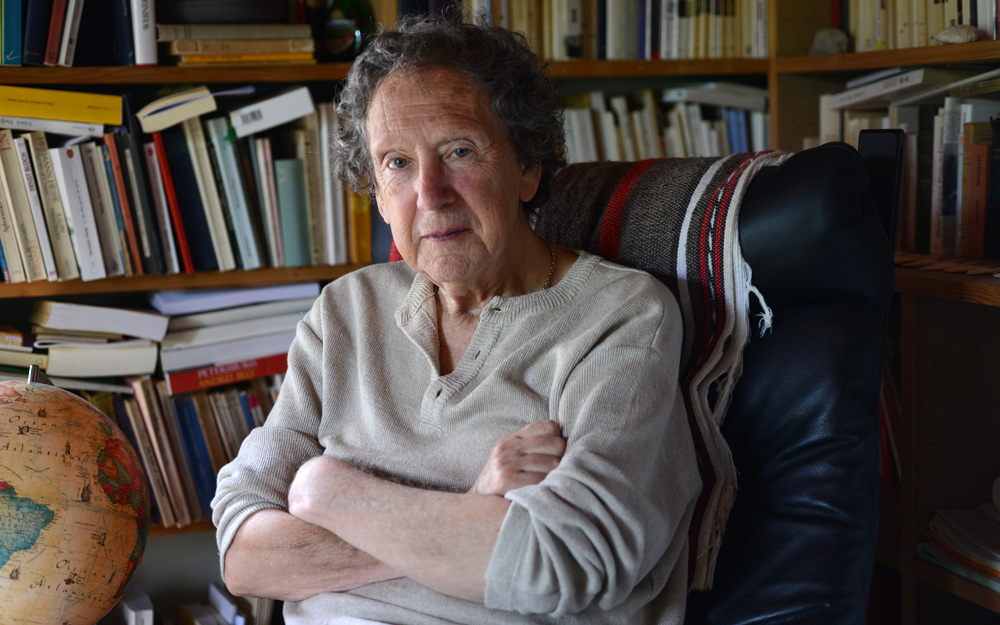
Kenneth White’s Portrait
a brief outline
Born in Scotland, based in France as from 1967, Kenneth White says he is Scottish by his origins, French by adoption, European in mentality, but the whole world is his workfield.
The author of a multi-faceted body of work, he was early on marked by two fields of force : what he called in his first writings « the furnaces of the city » and the « white world » of natural space. On the one hand, Glasgow, international port and one of the focal points of the industrial revolution, where he spent his early years in a working-class environment. On the other, a village on Scotland’s west coast where his father, a railway signalman, got himself transferred in order to raise his family in more favourable circumstances.
The young Kenneth was much attracted to the natural context he then had at his disposal. He spent long hours walking along the coast, and « shamanized » on the moors and in the woods of the back-country. Thereafter, in his adolescence, while continuing to haunt shore and moor, he became a voracious reader, studying the geology, ornithology and archaeology of his territory, discovering the work of authors such as John Ruskin, John Muir and Gilbert White, and the Americans Thoreau and Melville. Later, as a student in Glasgow, where he read ancient languages (Latin, Greek), modern languages (French, German) and philosophy, he plunged into the history of cities and civilisations, looking also into a literature (Baudelaire, Dostoyevsky…) that echoed his own experience on the pavements of his native town.
A highly individualistic student, White broke the normal course of study to spend a year in Germany, at Munich. But after his return to Glasgow, his eyes were turned more and more to France, convinced as he was that in France certain intellectual advances had been made that had simply no equivalent in the Anglo-Saxon sphere, or in post-war Germany. Which is why, with his diploma and a postgraduate scholarship in his pocket, he made, not for Oxford or Cambridge, but, with no hesitation whatever, for Paris. If he had already begun to write in Glasgow, it was in Paris that he published his first texts, immediately remarked on, among others, by André Breton, who discerned in them « a rare new accent ».
This was to be the beginning of a complex oeuvre, written partly in English, partly in French, comprising autobiographical narratives (travels, residence in various places), essays and poetry. As to style, the writing was out to be as natural and accessible as possible, devoid of affectation and mannerism, while maintaining a strong line and a high tone.
Out of the city experience of his origins he has developed a radical social and cultural critique allied to the search for essential elements among the cultures of the world and in the direct experience of landscapes. It is all this that is implied in what he calls his intellectual nomadism. As to his early and prolonged experience of nature, it has lead to the conviction that, in the absence of a sensitive and intelligent contact with the whole non-human context, human life can only decline and deteriorate. It is this which has given rise to the other general theme of his work : geopoetics.
In order to complete this preliminary sketch, it’s important to note that if in White’s life his writing activity is central, he has always practised also a type of activism. This has taken the form of teaching posts at several universities in Scotland and in France (White has always considered his teaching as the oral prolongation of this writing). It has also resulted in the creation of various groups of reflection and action, all of these culminating in the formation in 1989 of the International Institute of Geopoetics.
Kenneth White’s books, written now in English, now in French (the great majority of his books written in English exist also in French versions), have been translated into many different languages : German, Italian, Spanish, Portuguese, Dutch, Bulgarian, Serbo-Croat, Macedonian, Polish, Turkish, Russian.
see as well